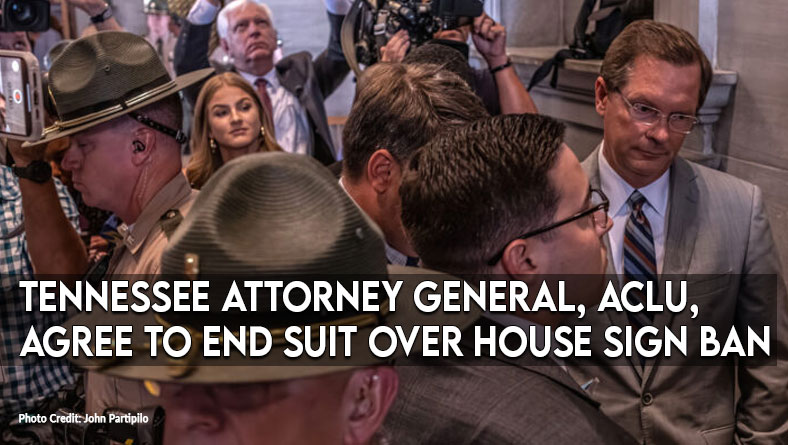The lawsuit stemmed from new House of Representatives rules during a contentious special legislative session.
Image: House Speaker Cameron Sexton was surrounded by chanting protesters as he left the Tennessee House Chambers on Aug. 24, 2023 during a special legislative session. Image Credit: John Partipilo
By Anita Wadhwani [Tennessee Lookout -CC BY-NC-ND 4.0] –
In a coda to a bruising special session of the Tennessee Legislature that wrapped up last month, lawyers representing three women who defied a House ban on signs and attorneys for the state have agreed to bring a First Amendment legal challenge to a close.
The challenge to new House rules that barred protest signs was filed on the third day of Tennessee’s specially called session on public safety — after state troopers removed three women quietly holding pieces of paper that read “1 KID > ALL THE GUNS” from a legislative committee room.

As contentious gatherings and frustrated protestors crowded the legislative session, inside a Nashville courthouse Chancellor Anne Martin immediately granted a temporary restraining order preventing the ban on signs from being enforced. Five days later, Martin ruled again, finding that the sign ban would likely be found unconstitutional at trial. House leaders were unable to enforce the ban for five of the seven days of the special session.
Attorneys for the Tennessee Attorney General, representing House Speaker Cameron Sexton, the Tennessee Highway Patrol and other enforcers of the ban have now asked for the case to be dismissed as moot.
“The special session has now adjourned,” the state’s legal filings said. “And the procedural rules adopted by the House for the special session — including the Sign Regulation that the (women) asked this court to declare unconstitutional and enjoin — are no longer in effect.”
Attorneys for the ACLU of Tennessee, who represented the three women — Allison Polidor, Erica Bowton and Maryam Abolfazli — do not oppose dismissing the case, but expect to file a motion seeking attorney fees and costs from the state, legal filings said.

The House rule banning signs during the special session originated in a private meeting in Sexton’s office that took place without public notice on the first day of the special session, the Tennessean reported. The 31 pages outlining the special session’s rules relied largely on a template for the House’s permanent rules of order, but added this sentence:
“No voice or noise amplification devices, flags, signs, or banners shall be permitted in the galleries of the House of Representatives.”
The House’s permanent rules of order for the 113th Assembly, which reconvenes in January for the second year of its two-year cycle, do not currently contain the same sentence.
*Note: This article was edited for length and style by The Tennessee Conservative per The Tennessee Lookout’s republishing guidelines.



